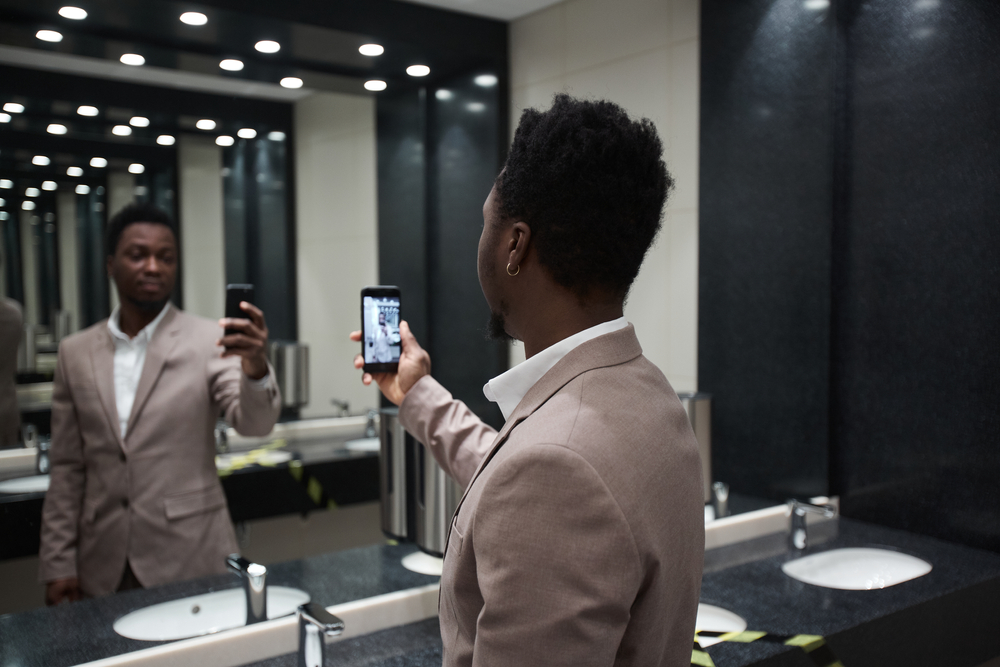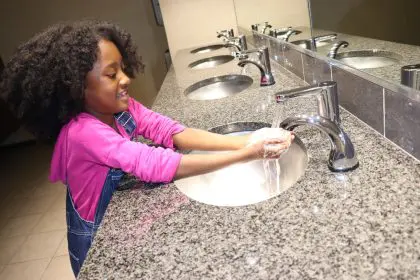The modern bathroom has become an extension of our digital workspace and social hub, but experts warn this habit carries significant risks. From spreading dangerous bacteria to compromising privacy, the seemingly innocent act of bringing phones into bathrooms creates a cascade of potential problems that affect both individual and public health.
The microscopic threat
When phones enter bathroom environments, they become vehicles for harmful microorganisms. Research shows bathroom surfaces harbor various pathogens, including E. coli and salmonella. These bacteria readily transfer to mobile devices placed on countertops, toilet paper holders, or any bathroom surface.
The risk intensifies in public restrooms, where multiple users increase germ concentration. Environmental health studies indicate that a single toilet flush can release aerosolized particles containing bacteria and viruses, which can settle on nearby surfaces – including smartphones.
Most concerning is the cycle of contamination: while people generally wash their hands after using the bathroom, they rarely clean their phones. This oversight creates a continuous chain of germ transmission throughout the day. Recent studies show that the average smartphone carries ten times more bacteria than most toilet seats, with some devices hosting up to 17,000 bacterial gene copies.
Healthcare professionals report an increase in bacterial infections potentially linked to contaminated mobile devices. These infections range from minor skin irritations to more serious gastrointestinal issues, particularly in individuals with compromised immune systems.
Digital privacy at risk
The bathroom phone habit extends beyond hygiene concerns into the realm of privacy and security. Public restrooms, with their mirrors and confined spaces, create opportunities for accidental privacy breaches through phone cameras.
The risks multiply in spaces with public Wi-Fi networks. Cybersecurity experts note that public networks, particularly in commercial buildings and shopping centers, often lack proper security protocols. Users checking emails or conducting business in these locations expose themselves to potential data theft.
Digital security breaches in bathroom environments have increased significantly over the past five years. Law enforcement agencies report a rise in privacy violations involving mobile devices in restrooms, from accidental recording incidents to deliberate privacy invasions.
Consider these digital vulnerability points:
- Automatic Wi-Fi connections that expose personal data
- Accidental activation of cameras or recording features
- Location tracking through mobile apps
- Unauthorized network access in public facilities
- Cloud synchronization of sensitive information
- Bluetooth vulnerability in confined spaces
- Unintentional data sharing through nearby device connections
The social impact
The proliferation of phones in bathrooms has transformed these once-private spaces into extensions of our connected world. This shift affects both individual behavior and social norms:
- Extended bathroom occupancy times impact facility availability
- Decreased attention to proper hygiene practices
- Disrupted workplace productivity
- Compromised professional image
- Increased noise pollution in public facilities
- Deteriorating interpersonal boundaries
- Workplace efficiency reduction due to extended breaks
Corporate studies indicate that bathroom phone usage contributes to an average of 20 minutes of lost productivity per employee daily, amounting to significant cumulative losses for organizations.
Mental health considerations
The compulsion to remain connected even during bathroom breaks signals a deeper issue with digital dependency. Mental health professionals point to several concerning patterns:
- Increased anxiety from constant connectivity
- Disrupted natural breaks in daily routines
- Reduced mindfulness and self-reflection time
- Physical strain from prolonged sitting
- Sleep pattern disruption from blue light exposure
- Heightened stress from work-related accessibility
- Diminished personal boundaries
Psychologists report that the inability to disconnect, even briefly, can lead to increased levels of anxiety and decreased overall well-being. The bathroom, traditionally a space for privacy and mental reset, loses its psychological benefit when digital distractions persist.
Creating better habits
Addressing these concerns requires conscious effort and behavioral changes. Health and technology experts recommend several practical approaches:
Establish phone-free zones within bathrooms, particularly in professional settings. Regular sanitization of mobile devices, especially after bathroom exposure. Implementation of strict privacy policies in public facilities.
Organizations can lead this change by:
- Installing phone storage solutions outside restrooms
- Providing sanitization stations for mobile devices
- Developing clear policies about device usage in private spaces
- Educating employees about health and privacy risks
- Creating designated communication breaks during workdays
- Implementing workplace wellness programs focused on digital boundaries
- Offering incentives for maintaining phone-free zones
Moving forward
The intersection of technology and personal space requires thoughtful navigation. While completely eliminating phones from bathrooms may seem impractical in today’s connected world, understanding and mitigating the risks becomes crucial.
Recent workplace studies show that companies implementing phone-free bathroom policies report improved employee well-being and reduced sick days. These results suggest that small changes in phone habits can lead to significant improvements in both personal and public health.
As our reliance on mobile devices continues to grow, so does the importance of establishing boundaries. The bathroom, traditionally a space for privacy and personal care, deserves reconsideration in our digital age. By acknowledging the risks and taking preventive measures, we can maintain both our health and our privacy while staying connected in appropriate spaces.
This story was created using AI technology.












